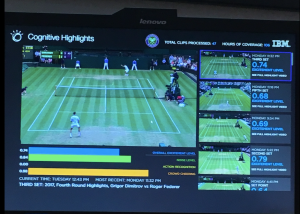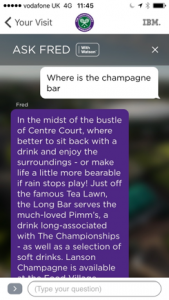Every year, I adore absorbing everything about The Championships, with Wimbledon, the tennis and technology continually become more amazing and inspiring.

This year the tennis has been phenomenal and my highlight was watching Johanna Konta beat Simona Halep to get to the semi-finals. It was an epic match with many twists and turns and Konta’s victory was a real “Yeah” moment! Equally the weather that day was wonderfully British, but rain did not stop play; even though it was so wet that all other courts were closed, action continued on Centre Court where the roof cover was deployed. But, amidst the rain the rest of Wimbledon navigated their way with umbrellas, strawberries and cream and some with glasses of Pimms to Henman Hill to watch Konta triumph, via live feed on the large screen – I’d know, I was there!

Watson has been used for many years at The Wimbledon Championships; it enables the brand to scale from tennis club to a coveted , world class sporting event, media curator and producer, and technology pioneer and innovator over a spectacular fortnight in SW19.
For me there were three new cognitive based highlights I was excited to see this year, including the new “Ask Fred” chatbot which is part of the Wimbledon App – I will delve into this in a moment. I was wowed by the behind the scenes cognitive innovations in the IBM Bunker demonstrating the technology behind the tennis; I was very taken with the Cognitive Highlights Dashboard which identified the most exciting moments from a match based on noise levels, crowd cheering and action recognition. An example of action recognition is where Watson can recognise the significance of player actions such as when they shake hands at the end of the game. Most of these feeds are unstructured and not obviously logical data but using Watson APIs can be interpreted to give insight in a meaningful way. The cognitive highlights capability automatically identifies iconic moments and match events of interest from hours of footage across six show courts, which can then be served up to the media.

The third cognitive output I was inspired by was the competitive margin metrics. The use of this metric helps the Wimbledon editorial team tell stories about the matches in more insightful ways as play unfolds. This gives extra insight to the fans by creating contextual content on a deeper level of engagement. It works with a huge set of information collated for each player that identifies their performance against many metrics; the closer the margins are rated by Watson the potentially more intense and eventful their game may be.
ASK FRED named after Britain’s legendary three-time Wimbledon Champion Fred Perry!
For the majority of visitors to Wimbledon each year, it is their first visit and they want to make the most of their day! So, the Watson-enabled chatbot “Ask Fred” is a great source of information for them and one that is easy to use because it understands natural language and conversation.
The chatbot uses cognitive capabilities to understand, reason and learn. It provides conversational concierge style Q&A for Wimbledon related topics such as “Where can I buy strawberries and cream?” by identifying and understanding the intent and entities used in the question.
The intent is the part of their dialogue which identifies the type of question being asked, such as – how do I find…, where can I get… when is the next…., what time does…., where can I buy…..; and the entity would be the target part of the dialogue such as: Strawberries and Cream, Pimms, Court 17, Henman Hill, Champagne Bar, Umbrella. “Ask Fred” also understands a number of typos, spelling variations and poor grammar.
[easy-tweet tweet=”The “Ask Fred” chatbot is a fabulous way to gain insights about what visitors are interested in.” hashtags=”IoT, Wimbledon”]
The “Ask Fred” app uses cognitive “Natural Language Processing” capabilities. These

are employed to interpret our written dialogue (or question) in context and translate that into something very logical which can be processed to provide an answer rather than a generic list of results. This is conversational Q&A beyond the confines of a search engine .The Watson Conversations offering is the IBM technology that enables the development of a chatbot.
The “Ask Fred” chatbot is a fabulous way to gain insights about what visitors are interested in and discover what information they want during their Wimbledon visit. By collating their questions and discussions held with “Ask Fred” their queries can be fed into a continuous development loop so the “Ask Fred” corpus or knowledge base can be expanded to become more comprehensive and honed – cognitive technology and “Ask Fred” is very much about learning and evolving into something better through feedback!
If you want to check out the Watson Conversations and Natural Language capabilities you can create your own free trial Bluemix account and build your own Chatbot – check out the link and have a go today, even I have built one!
IBM has been the Official Information Technology Supplier and Consultant to the All England Club and The Championships, Wimbledon, for 28 years.
For more information on the technology behind The Championships, go to ibmuk.co/insta
Moya is an IBM Executive Architect and Cloud & Cognitive Technical Leader at IBM. She has many years of experience working as an architect in Finance and E&U sectors, and she also has a passion for Machine Learning and cognitive systems. She loves sport and has been known to run an ultra marathons or two.



